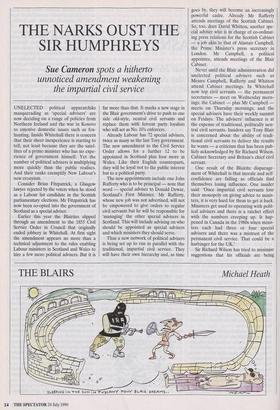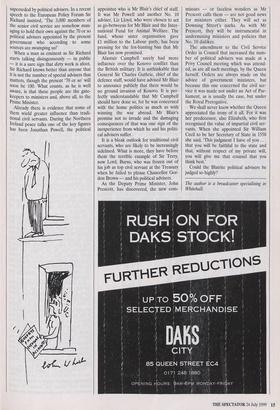THE NARKS OUST THE SIR HUMPHREYS
Sue Cameron spots a hitherto
unnoticed amendment weakening the impartial civil service
UNELECTED political apparatchiks masquerading as 'special advisers' are now deciding on a range of policies from Northern Ireland and the war in Kosovo to emotive domestic issues such as fox- hunting. Inside Whitehall there is concern that their sheer inexperience is starting to tell, not least because they are the satel- lites of a prime minister who has no expe- rience of government himself. Yet the number of political advisers is multiplying more quickly than the public realises. And their ranks exemplify New Labour's new cronyism.
Consider Brian Fitzpatrick, a Glasgow lawyer rejected by the voters when he stood as a Labour list candidate in the Scottish parliamentary elections. Mr Fitzpatrick has now been co-opted into the government of Scotland as a special adviser.
Earlier this year the Blairites slipped through an amendment to the 1855 Civil Service Order in Council that originally ended jobbery in Whitehall. At first sight the amendment appears no more than a technical adjustment to the rules enabling Labour ministers in Scotland and Wales to hire a few more political advisers. But it is far more than that. It marks a new stage in the Blair government's drive to push to one side old-style, neutral civil servants and replace them with fervent party loyalists who will act as No. 10's enforcers.
Already Labour has 72 special advisers, twice as many as the last Tory government. The new amendment to the Civil Service Order allows for a further 12 to be appointed in Scotland plus four more in Wales. Like their English counterparts, they will be loyal not to the public interest but to a political party.
The new appointments include one John Rafferty who is to be principal — note that word — special adviser to Donald Dewar, Scotland's First Minister. Mr Rafferty, whose new job was not advertised, will not be empowered to give orders to regular civil servants but he will be responsible for `managing' the other special advisers in Scotland. This will include advising on who should be appointed as special advisers and which ministers they should serve.
Thus a new network of political advisers is being set up to run in parallel with the traditional, impartial civil service. They will have their own hierarchy and, as time goes by, they will become an increasingly powerful cadre. Already Mr Rafferty attends meetings of the Scottish Cabinet. So, too, does David Whitton, another spe- cial adviser who is in charge of co-ordinat- ing press relations for the Scottish Cabinet — a job akin to that of Alastair Campbell, the Prime Minister's press secretary in London. Mr Campbell, a political appointee, attends meetings of the Blair Cabinet.
Never until the Blair administration did unelected political advisers such as Messrs Campbell, Rafferty and Whitton attend Cabinet meetings. In Whitehall now top civil servants — the permanent secretaries — meet on Wednesday morn- ings; the Cabinet — plus Mr Campbell meets on Thursday mornings; and the special advisers have their weekly summit on Fridays. The advisers' influence is at the expense of traditional, politically neu- tral civil servants. Insiders say Tony Blair is concerned about the ability of tradi- tional civil servants to deliver the results he wants — a criticism that has been pub- licly acknowledged by Sir Richard Wilson, Cabinet Secretary and Britain's chief civil servant.
One result of the Blairite disparage- ment of Whitehall is that morale and self- confidence are falling as officials find themselves losing influence. One insider said: 'Once impartial civil servants lose their monopoly on giving advice to minis- ters, it is very hard for them to get it back. Ministers get used to operating with polit- ical advisers and there is a ratchet effect with the numbers creeping up. It hap- pened in Canada in the 1980s when minis- ters each had three or four special advisers and there was a mistrust of the permanent civil service. That could be a harbinger for the UK.'
Sir Richard Wilson has tried to minimise suggestions that his officials are being superseded by political advisers. In a recent speech to the European Policy Forum Sir Richard insisted, 'The 3,000 members of the senior civil service are somehow man- aging to hold their own against the 70 or so political advisers appointed by the present government who according to some sources are swamping us!'
When a man as eminent as Sir Richard starts talking disingenuously — in public — it is a sure sign that dirty work is afoot. Sir Richard knows better than anyone that it is not the number of special advisers that matters, though the present '70 or so' will soon be 100. What counts, as he is well aware, is that these people are the gate- keepers to ministers and, above all, to the Prime Minister.
Already there is evidence that some of them wield greater influence than tradi- tional civil servants. During the Northern Ireland peace talks one of the key figures has been Jonathan Powell, the political appointee who is Mr Blair's chief of staff. It was Mr Powell and another No. 10 adviser, Liz Lloyd, who were chosen to act as go-betweens for Mr Blair and the Inter- national Fund for Animal Welfare. The fund, whose sister organisation gave £1 million to the Labour party, has been pressing for the fox-hunting ban that Mr Blair has now promised.
Alastair Campbell surely had more influence over the Kosovo conflict than the British military. It is unthinkable that General Sir Charles Guthrie, chief of the defence staff, would have advised Mr Blair to announce publicly that there would be no ground invasion of Kosovo. It is per- fectly understandable that Mr Campbell should have done so, for he was concerned with the home politics as much as with winning the war abroad. Mr Blair's promise not to invade and the damaging consequences of that was one sign of the inexperience from which he and his politi- cal advisers suffer.
It is a bleak outlook for traditional civil servants, who are likely to be increasingly sidelined. What is more, they have before them the terrible example of Sir Terry, now Lord, Burns, who was frozen out of his job as top civil servant at the Treasury when he failed to please Chancellor Gor- don Brown — and his political advisers.
As the Deputy Prime Minister, John Prescott, has discovered, the new corn- missars — or faceless wonders as Mr Prescott calls them — are not good news for ministers either. They will act as Downing Street's narks. As with Mr Prescott, they will be instrumental in undermining ministers and policies that No. 10 dislikes.
The amendment to the Civil Service Order in Council that increased the num- ber of political advisers was made at a Privy Council meeting which was attend- ed, as are all such meetings, by the Queen herself. Orders are always made on the advice of government ministers, but because this one concerned the civil ser- vice it was made not under an Act of Par- liament, as is usually the case, but under the Royal Prerogative.
We shall never know whether the Queen appreciated the irony of it all. For it was her predecessor, also Elizabeth, who first recognised the value of impartial civil ser- vants. When she appointed Sir William Cecil to be her Secretary of State in 1558 she said, 'This judgment I have of you . . . that you will be faithful to the state and that, without respect of my private will, you will give me that counsel that you think best.'
Could the Blairite political advisers be judged so highly?
The author is a broadcaster specialising in Whitehall.



























































 Previous page
Previous page